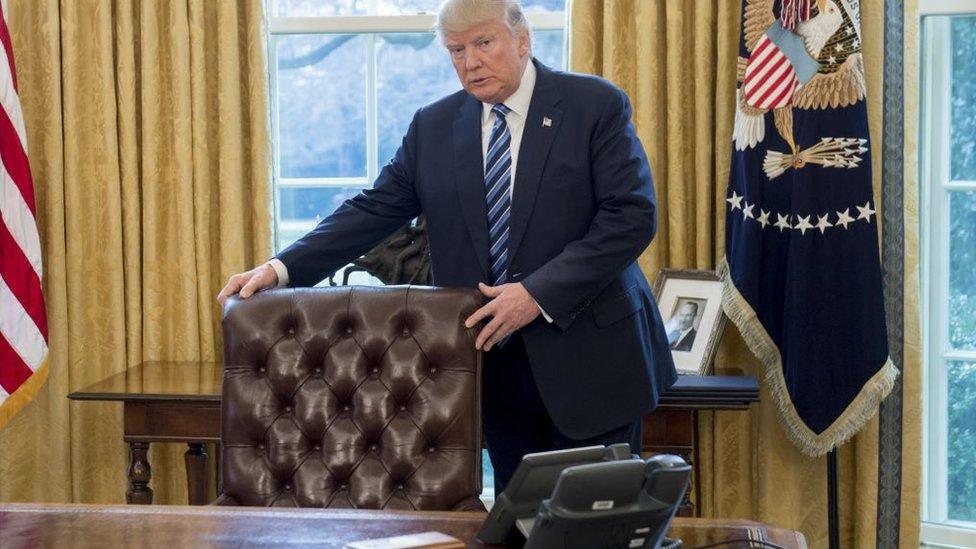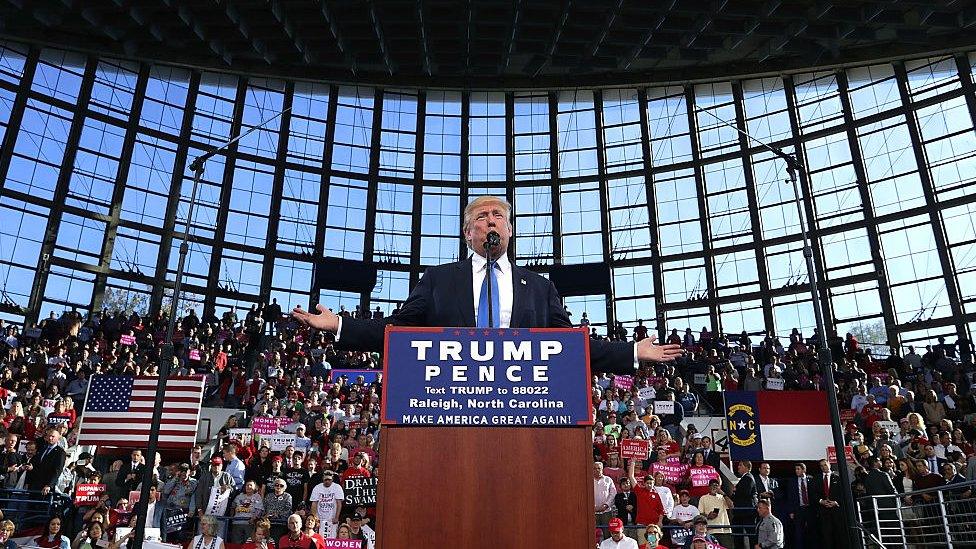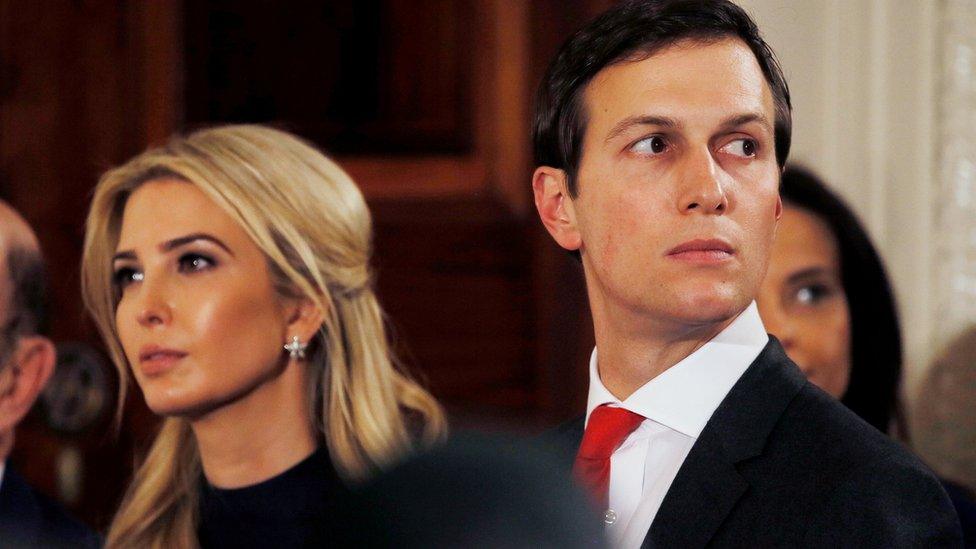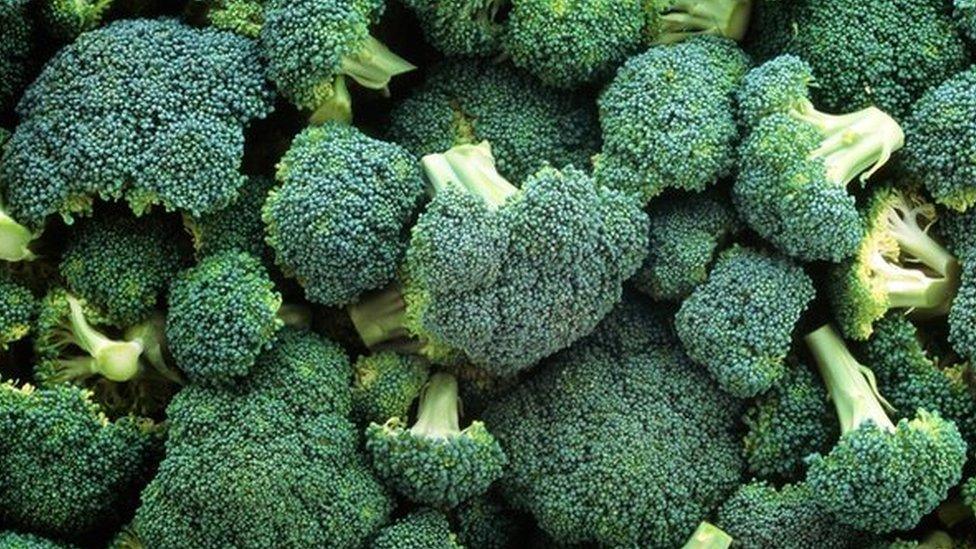Is Trump now part of the establishment?
- Published

Donald Trump campaigned for president as the ultimate outsider, promising to unseat a corrupt and atrophied Washington establishment. Now, after two months in office, has he become the establishment? Are Trump and his team the insiders now?
One thing the recent collapse of healthcare reform efforts in the House of Representatives has revealed is just how quickly attitudes and alliances can shift in Washington, DC.
Last year Mr Trump and members of the House Freedom Caucus, a collection of 30 or so libertarian-leaning fiscal conservatives in Congress, were singing from the same anti-government hymnal.
Now, however, Mr Trump is the government - and he teamed up with congressional leadership to back a healthcare bill that conservative hard-liners believe didn't go far enough in undoing the 2009 Democratic-designed system.
The effort's failure set off back-and-forth sniping between Mr Trump and the Freedom Caucus that morphed into a classic insider-outsider faceoff, with Mr Trump cast as the new voice of the powers that be.
Freedom Caucus - Do these 29 white men run America?
Congressman Justin Amash said the White House has become part of the hated status quo - the "Trumpstablishment", he called it in a Saturday tweet.
Ivanka Trump treads gingerly into West Wing ethics minefield
That line drew the ire of Mr Trump's director of social media, Dan Scavino Jr, who tweeted, external that Mr Amash was a "big liability" and encouraged Michigan voters to unseat him in next year's Republican primary. (The tweet has since been criticised, external as a possible violation of a federal law preventing executive branch officials from attempting to influence election campaigns.)
If Mr Trump's conservative critics are trying to make the case that the president has become the establishment he campaigned against, their arguments have been buttressed by the financial disclosure documents released by the White House on Friday evening, which revealed exactly how well-heeled and connected many of the top White House staff are. According to, external the Washington Post, 27 members of Mr Trump's team have combined assets exceeding $2.3bn (£1.84bn).
Presidential daughter Ivanka Trump and her husband, Jared Kushner - both unpaid presidential advisers - are worth roughly $740m.
Senior White House strategist Steve Bannon earned as much as $2.3 million in 2017. Gary Cohn, a former Goldman Sachs executive who is one of Mr Trump's top economics advisers, has a net worth approaching $611m.
The New York Times points out, external that many in the inner circle of the putatively anti-establishment Mr Trump drew significant sums from the network of big-money political donors, think tanks and associated political action committees that populate the Washington insider firmament.
"The figures reveal the extent to which private political work has bolstered the financial fortunes of Trump aides, who have made millions of dollars from Republican and other conservative causes in recent years," the paper reported.
Already there are signs that conservative true-believers - some of whom were never fully sold on Mr Trump to begin with - are questioning Mr Trump's anti-establishment bona fides.
"That's the dirty little secret," writes, external conservative columnist Ben Shapiro. "Trump isn't anti-establishment; he's pro-establishment so long as he's the establishment."
Even conservative radio host Laura Ingraham, an early Trump supporter, is having some doubts.

During the 2016 presidential campaign, Donald Trump railed against the Washington establishment
"I think it is really, really unhelpful to Donald Trump's ultimate agenda to slam the very people who are going to be propping up his border wall, all the things he wants to do on immigration, on trade," she said, external on Fox News."I don't know where he thinks he's going to get his friends on those issues."
Perhaps of greatest concern to Mr Trump is that the failure to enact promised healthcare reform, along with his recent feud with members of his own party, have been accompanied by a softening of his core support in recent polls.
In a Rasmussen survey, external, the number of Americans who "strongly approve" of the president has dropped from 44% at shortly after his inauguration to 28% today. While the Republican base is largely sticking with Mr Trump so far, they may be starting to have some doubts.
For much of 2016 Donald Trump was the barbarian at the gate, threatening to rain fire on the comfortable Washington power elite. Even in his January inaugural address, he condemned an establishment that "protected itself" at the cost of average Americans.
"Their victories have not been your victories; their triumphs have not been your triumphs; and while they celebrated in our nation's capital, there was little to celebrate for struggling families all across our land," he said.
Now, however, Mr Trump and his team of formerly angry outsiders meet in the Oval Office. They fly on Air Force One. They host events in the White House rose garden. They issue tweets warning apostates of harsh political consequences.
They walk the halls of power and call the shots.
It doesn't get any more "insider" than that.
- Published1 April 2017

- Published1 April 2017
